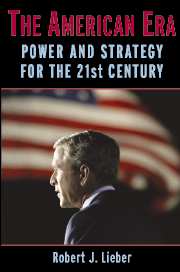Book contents
- Frontmatter
- Contents
- Preface
- THE AMERICAN ERA
- Introduction
- 1 Caveat Empire: How to Think about American Power
- 2 New (and Old) Grand Strategy
- 3 Europe: Symbolic Reactions and Common Threats
- 4 Globalization, Culture, and Identities in Crisis
- 5 Iraq and the Middle East: Dilemmas of U.S. Power
- 6 Asia's American Pacifier
- 7 Why They Hate Us and Why They Love Us
- Notes
- Index
7 - Why They Hate Us and Why They Love Us
Published online by Cambridge University Press: 24 May 2010
- Frontmatter
- Contents
- Preface
- THE AMERICAN ERA
- Introduction
- 1 Caveat Empire: How to Think about American Power
- 2 New (and Old) Grand Strategy
- 3 Europe: Symbolic Reactions and Common Threats
- 4 Globalization, Culture, and Identities in Crisis
- 5 Iraq and the Middle East: Dilemmas of U.S. Power
- 6 Asia's American Pacifier
- 7 Why They Hate Us and Why They Love Us
- Notes
- Index
Summary
Let faraway America and its white buildings come crashing down.
– Louis Aragon, 1925The U.S. has rabies.
– Jean-Paul Sartre, 1953The U.S. is the greatest danger in the world today to peace.
– President Charles de Gaulle, 1965Yankee go home but take me with you.
– Jairam Ramesh, 1999You should know that seeking to kill Americans and Jews everywhere in the world is one of the greatest duties [for Muslims], and the good deed most preferred by Allah, the Exalted….
Osama bin Laden, 2003May the U.S. Marines finally come.
– Sueddeutsche Zeitung (Munich), calling for American intervention in Liberia, 2003Foreign reactions to the United States are remarkably contradictory. In large parts of Europe there was a spontaneous outpouring of solidarity with the American people immediately after the 9/11 attacks, and in a widely quoted headline, the elite French newspaper Le Monde, normally the exemplar of condescension toward the United States, proclaimed, “We are all Americans now.” However, within months, much of the European media and intellectual elites shifted toward fiercely critical attitudes, and opinion polls showed alarming increases in negative views of American policies and of the United States itself. Elsewhere, especially in Arab and Muslim countries and portions of the developing world, pervasive hostility has been widely evident. Yet many of the same people who denounce the United States and demonstrate against the Great Satan find that the lure of an American education or the employment opportunity provided by a green card exerts an immense attraction.
- Type
- Chapter
- Information
- The American EraPower and Strategy for the 21st Century, pp. 177 - 202Publisher: Cambridge University PressPrint publication year: 2005



